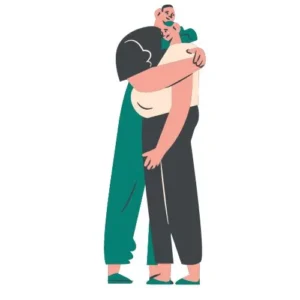Opening Thought
Marriage is the legal union of two people of sound mind having contractual obligations and reciprocal consent with each other. In the set story, there is no horrible husband, and the main role of the husband within the family is to support his wife during happy times. This entails non-compassionate listening, acceptance of emotions, and physical-spiritual availability.
It may be hard to know how to be with her if your wife harbors feelings of frustration or sadness because of something. You might want to get the solution and make her happy again as soon as possible, though. And with her, you can solve them all because loving her means showing her empathy and comforting her.
These important guidelines are stated to assist you in comprehending your wife’s problem, standing by her and supporting her in the difficult moments, as well as getting closer to her husband.
Common Sources of a Wife’s Pain

Before diving into how to respond, it helps to understand where her hurt may stem from. Here are some of the most common sources of pain for wives:
- Physical pain: Pain, which is headaches, cuts, fibromyalgia, endometriosis, and childbirth pains is the most unrelenting illness. This kind of piercing pain even drains all of her.
- Psychological wound: Stress can also cause such emotional pain as stress, depression, anxiety, loss of a loved one, loneliness, and low self-esteem. Recognize them when done, for what they are and appreciate their value.
- Relational pain: Your family, friends, coworkers, or mere misunderstanding may be the main setting of her love life. Listen to her without getting angry.
- Holy confusion: Losing God or even doubts in core beliefs have become the basic root of the woman’s unhappiness.
- Vicarious pain: The earlier traumas concerning sexually unfriendly relations, physical violence, abandonment, and the like can be reborn and inflict a lot of pain. Do not attempt to make it right, just sit beside her.
Knowing where her hurt comes from helps you respond appropriately with care and wisdom.
How to Be Present in Her Pain

Simply being present with your wife in her suffering can be profoundly comforting. Here are some tips for being present to her in pain:
- Make eye contact but one has to be careful not the stare at her. Make eye contact to convey respect with a smiling and directly forward beseeching look.
- Keep your posture open. Stand comfortable and do not tense up or close your body too much. Don’t place your arms across your chest or your hands on your hips making you look stiff or aggressive.
- Touch can be light. If possible hug her or simply touch her hand or pat her on her back. Queer physical spaces to her satisfaction and comfort based on how she feels comfortable being positioned in the open region.
- Breathe deeply and slowly. Your relaxed breathing might help her make her nervous system more relaxed.
- Don’t talk. If it’s important to her to know that she can remain silent, then silences enable her to speak with no restraint. Make sure they allow her time to talk in response.
- This is a call to manifest feelings that are in tandem with hers. A sensitive response is required, so if she cries, staying altered and stiff should not be the answer. Let her see how you treat her.
- Be patient. It also does not mean that one should interrupt her to get her views on a certain issue. As such do not compel her to be in a hurry in the process.
Simply show up and have fully available signals that you want to understand and care about.
How to Listen and Understand

When your wife is ready to open up about her pain, empathetic listening is critical. Here are some tips:
- Listen without interrupting. It is alright to let her speak without offering your opinion.
- Reflect on what you hear: Repeat so it confirms and justifies expressions for the feelings she has let out.
- Ask open-ended questions: In case you notice that she has stopped talking, try to ask her, “What do you feel about it?” instead of, “Did that make you sad?”
- Let her know that you care to know: Make the following statement, “Can you show me how it is to feel that way?”
- Empathize: Delicate with the thing you value most, this is painful for her.
- We find your understanding or lack of it: Ask, “Did I get that right?” So you are saying, in actuality, I’ve got it. God and I’ve comprehended your emotions And your vision.
- It is fine to be quiet: You do not have to scramble to occupy those gaps of no sound. Let the conversation breathe.
Thoughtful listening shows your wife she can trust you with her inner world. Follow her lead rather than steering the direction.
Providing Comfort and Reassurance

In addition to your listening presence, your wife also needs comfort and reassurance as she goes through painful experiences. Here are some things you can say or do:
- Apologize for hurting her: Be accountable for what has been said/done. There is no reasoning, apology, or rationalization allowed.
- Validate feelings: you must explain to her it is okay to be sad, angry, etc., over this issue. Yes, they can go very low very incompatible very slippery but be very careful not to invalidate.
- Affirm strengths: could help remind her of moments she had to endure and pull through the struggles she faced ahead.
- Express care/commitment: reassure her of your presence, and that you are not leaving no matter how tough things get this season.
- Provide concrete assistance: There is always a need to phrase questions in a way such as, “What do you need right now?” and then act according to their wishes, like washing the dishes, preparing supper, taking care of the children, or whatever.
- Encourage health outlets: Of course, I recommend walking together, writing in a diary, or meeting a friend if she wants something to do.
- Have prayer together: if you are people of faith. Join in praying so that God can take her burdens, and give her comfort and guidance she needs at that level.
With the reassurance of your love and commitment, plus practical support, she will feel safe opening up more over time.
When to Seek Outside Help

While you can be a great support, your wife may also need counseling or medical care for deeper healing, including:
- Marriage counseling: If you both slightly have to freshen up your communication, conflict, or generally rekindle your relationship – make the appointment.
- Individual counseling: If the woman in question is depressed, anxious about something, has some traumatic past, etc., it will be most helpful for her to seek professional help in getting her wholeness. You can suggest that you help choose better or you can join initially and search together.
- Medical care. When you have physical pain, problems with pregnancy, sexual issues, or if you think that you might have a mental disorder contact your family physician and other specialists. If at all possible, accompany her to the appointments.
- Support groups. Being connected with other people who have the same issues helps to make your wife realize that she is not alone. There are local groups you can join or search for groups over the internet.
- Religious counseling: If both of you are believers, get a pastor/priest or wise religious leader who will talk to you and offer you advice based on your religion.
Getting the right help beyond your comfort eases the burden on you both while accelerating her healing.
In Summary
To show up for your wife in her times of pain means standing there, listening without reprieve, giving comfort and reassurance if at all possible, seeking further help if needed, and only then building intimacy over the long haul. Empathy, caring, and effort make you a trusted confidante and shelter in any storm. You travel through this life as one by choosing each day to listen rather than to fix.
It is the connection that knows you are loved just as you are; that is powerful medicine for a woman’s heart.
Disclaimer: This article provides general relationship education but is not professional medical or mental health advice. If your wife is experiencing severe or persistent pain or distress, please encourage her to seek diagnosis and treatment from a licensed therapist, counselor, or medical professional. Support her recovery by offering to accompany her to appointments. Additional assistance like couples counseling may also be beneficial.

